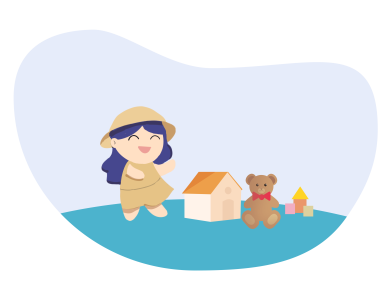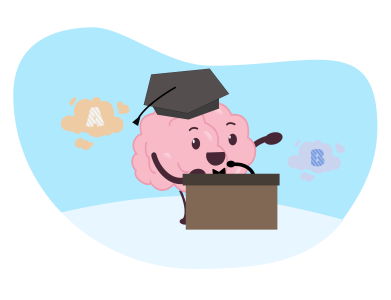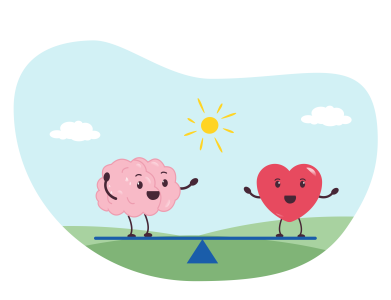
- GRIP Learning's Team
Piaget's four stages of cognitive development help us understand how children's ability to reason and draw conclusions grows over time.
Like us, you may have wondered how to explain consciousness to a child. The problem is that the majority of people, including many adults, are clueless about what it means to be conscious. Therefore, if you bring it up, you’ll either get a confused silence or an annoyed emoji. However, there is no need for shame; we fully understand.
If a child asks an adult, “What is consciousness?” the adult can simply explain that there are many levels of awareness and ask more about the child’s own experiences. Here, we’ll go over some of the most typical parental reactions to the topic of awareness with kids, as well as some tips for responding to kids’ further inquiries.
In the beginning, it is necessary to define awareness. The act of becoming aware of something is awareness. The Latin word for consciousness is conscientia, which means “to know from direct personal experience.” similar to learning new words from a dictionary. Learning a new word allows you to acquire an understanding of its meaning and the ability to incorporate it into your vocabulary. When something enters your conscious awareness, you can subsequently incorporate it into meaningful sentences and thoughts. The definition of “awareness” is the acquisition of new information, such as familiarity with a new word.
Consciousness is an abstract and complex idea that is unique to each person. You can make comparisons between this and the concepts of self-awareness and consciousness. Nonetheless, if you lack prior experience, it will be difficult for you to understand. Consciousness, in its simplest definition, is the state of being fully awake and aware within one’s own physical body.
The ability to be aware of things is crucial. Teachers instill in children the importance of being conscientious, ministers preach to their congregations about the need to be conscientious, counselors help their clients become more conscientious, and the general public applauds us for being responsible members of society. For this reason, it should come as no surprise that teaching children that their actions and words have consequences for themselves and those around them is a priority.
There are numerous perspectives from which to approach the study of consciousness, making this an extremely complex field of study. Children’s expressions of head-scratching and uncertainty when adults discuss the topic reveal the difficulty they have in conceptualizing it. Consciousness occurs on a spectrum, and this must always be kept in mind. Consciousness comes in numerous forms, from sleepwalking to full-on wakefulness.
How we feel about ourselves and the world around us fluctuates with our evolving consciousness. The state of mind can change during the day and in response to new stimuli. To give just one example, a person’s level of alertness could rise or fall depending on whether they are with their schoolmates or their family. If a young child ever asks you, “How do humans become conscious?” You can use these cases to explain the wide range of possibilities. When discussing consciousness with children, it is also important to focus on the traits that distinguish us as humans. Dogs and horses, for example, aren’t really aware of anything outside themselves (dogs don’t really care if they’re hungry), so humans are really different from them since we have feelings and desires (which animals normally don’t have).
Alternatively, you could begin by emphasizing that the fact that we have the capacity for free will and to make our own decisions is what makes being human so fascinating. What this means is that there are instances where people choose not to eat.
It’s not as difficult as you might think to explain consciousness to your children. Understanding what it means to be conscious is the first step. You may have more engaging and thought-provoking talks with your child when you both have a basic awareness of the various ways that people can be conscious. As a next step, you could inquire about their personal experiences. Their explanations will be just as unique as yours, and if you do this, it will help them build an idea of what consciousness means to them.
It’s also important to recognize that 1) there are a variety of ways to be consciously aware, 2) individuals don’t always remember memories, and 3) sometimes when people appear to be asleep, they are fully awake and aware of everything that’s going on. 4) If someone is suffering from a headache or a stomachache, they are having an experience (which includes emotions, thoughts, feelings, etc.). The fifth reason is that some people experience dreams that are so vivid that they make them question whether they are awake or asleep. (6) People constantly experience emotions (like love or pain). There is no one correct way to be conscious; rather, each person must find their own method.

A child’s self-esteem and the respect of others around them are intimately related to the choices they make on a daily basis. It’s crucial for kids to learn early on that contributing positively to conversations and interactions with others leads to more joy and acceptance. A child takes a big step toward self-acceptance and social acceptance in the future when they learn that being optimistic makes them feel better and makes other people treat them better. Their quality of life will greatly improve as a result.
Showing kids the positive results they can get from behaving responsibly is a great method to get them to change their behavior. It’s a great way to teach your child that being kind pays off, as when you take them to the zoo with their friends after they stood up for a bullied kid on the playground. It may seem obvious to grownups, but children have to be shown the proper way to act before they can adopt that mindset. They had no idea what to expect. Possibilities occupy their lives like blank canvases. They will flourish if you teach them the proper methods.
Show your children how acting consciously can set them free from false assumptions and judgments. Educate them on the importance of embracing acceptance and peace as part of a conscious lifestyle. Do you have any idea how much your child will learn and how lovely their lives will become? Raising children to appreciate goodness and positivity will provide them more happiness and satisfaction throughout their life. Those beliefs in play, imagination, and exploration will set them free! This is a wonderful legacy to leave for future generations.
One of the best ways to teach children is to have discussions with them that encourage them to come to their own conclusions. Parroting will result in a child who smacks and then knows to say sorry, but teaching children about the causes and emotions behind these phrases can foster in your child a growing consciousness instead of a dictionary of words to use as rapid responses in difficult situations.
This allows your child to learn about the various types of individuals who share this planet with them while also giving them an opportunity to discover the motivations and feelings behind various events. Teaching your child compassion and acceptance requires you to model these traits in a setting that is different from their everyday lives.




